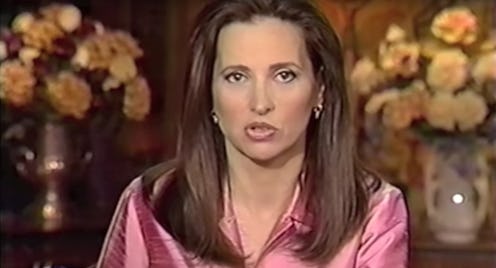News
The Woman Who Interviewed O.J. Simpson Was Motivated By Own Her Allegedly Abusive Ex
Publishing mogul Judith Regan is making headlines this week because her 12-year-old interview with O.J. Simpson, in which he famously "confessed" to the hypothetical murder of his ex-wife, is set to be released Sunday on Fox. Regan has said that she decided to interview Simpson, as well as publish his ghostwritten book, If I Did It, because she identifies as a victim of domestic abuse and was emotionally invested in getting Simpson to "confess." With O.J. Simpson: The Lost Confession in the headlines right now, you might find yourself wondering more about who Regan's ex-boyfriend is that was allegedly abusive toward her.
His name is David Buckley, and not much is known about him; unlike some of Regan's other suitors, Buckley wasn't in the limelight much. As Regan describes it in a 2011 essay, the two met while he was trying to take her parking space one day. Instead of getting into an argument with him, she writes that she was charmed by him asking her out and she accepted. She writes that she found him "the most beautiful man I'd ever seen."
Buckley was a psychologist. Regan later described him as "a great athlete. A brilliant mind." "He was even a doctor, with an M.D. after his name and a degree that came with an oath: 'First, do no harm,'" she said. "He was one of the brightest men I'd ever met."
The two had a child together, a son named Patrick, who now collaborates with his mother on business projects. The next year, Regan gave birth to a premature daughter who died shortly afterward. According to Regan, Buckley's behavior started to turn sour around that time.
Regan claims in the essay that Buckley punched her, broke windows, and threatened to kill himself. Buckley has partially disputed her claims, alleging in 2006 that he'd been a victim of Regan's physical abuse. "She was not a beaten woman," he told The New York Post. "If she got into a fight and had some scratches, it was because she attacked me. I never attacked her. She beat me up."
But Regan insists that she was the party wronged in that relationship. She writes that when Patrick was a toddler, Buckley left her (they had never married). She goes on to say that she tried to help him, in part by renting him an apartment in New York City and allowing him to visit her and Patrick. She writes that Buckley's frequent drinking and debauchery eventually encouraged her to end their by-then-platonic relationship.
Regan has suggested some of the anguish of that relationship motivated her to do the Simpson interview and agree to publish the former football star's book. Many people who believed that Simpson shouldn't have been acquitted of murder criticized her decision at that time, and Regan explained that she acted out of a desire to get Simpson to confess.
She told Fox News in 2006 that she expected Simpson to be exonerated in court. "I knew it, because I'd been there," she wrote. "I'd listened to the lies ('She hit herself’'), watched him charm the police ('Sir, I don’t know why she's saying this'), endured the ignorance of one cop who looked at me with disdain and said 'You must like it,' and couldn’t understand why they didn't believe me."
"I made the decision to publish this book, and to sit face to face with the killer, because I wanted him, and the men who broke my heart and your hearts, to tell the truth, to confess their sins, to do penance and to amend their lives," she continued, and added, "'To publish' does not mean 'to endorse'; it means 'to make public.'"
Buckley disputed this argument in his conversation with The New York Post. He claimed that Regan was victimizing herself to market Simpson's book and interview. "It's an entirely circumstantial story created to sell books and to sell books by someone who killed two people," he said.
Regan writes in that same 2011 essay that she forgave Buckley when she saw him at their son Patrick's wedding, many years later. Buckley had Parkinson’s disease at the time, and she writes that seeing him weakened made her feel remorse because "I had turned my back on him." She looks back on the wedding as a forgiving reunion between mother, father, and son.
